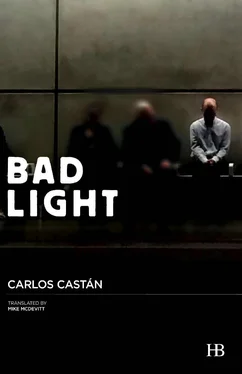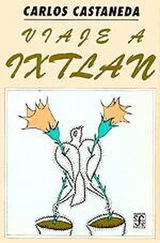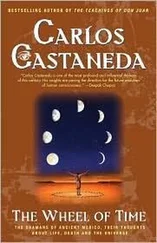Carlos Castán - Bad Light
Здесь есть возможность читать онлайн «Carlos Castán - Bad Light» весь текст электронной книги совершенно бесплатно (целиком полную версию без сокращений). В некоторых случаях можно слушать аудио, скачать через торрент в формате fb2 и присутствует краткое содержание. Год выпуска: 2016, Издательство: Hispabooks, Жанр: Современная проза, на английском языке. Описание произведения, (предисловие) а так же отзывы посетителей доступны на портале библиотеки ЛибКат.
- Название:Bad Light
- Автор:
- Издательство:Hispabooks
- Жанр:
- Год:2016
- ISBN:нет данных
- Рейтинг книги:5 / 5. Голосов: 1
-
Избранное:Добавить в избранное
- Отзывы:
-
Ваша оценка:
- 100
- 1
- 2
- 3
- 4
- 5
Bad Light: краткое содержание, описание и аннотация
Предлагаем к чтению аннотацию, описание, краткое содержание или предисловие (зависит от того, что написал сам автор книги «Bad Light»). Если вы не нашли необходимую информацию о книге — напишите в комментариях, мы постараемся отыскать её.
Carlos Castán
Bad Light
Bad Light — читать онлайн бесплатно полную книгу (весь текст) целиком
Ниже представлен текст книги, разбитый по страницам. Система сохранения места последней прочитанной страницы, позволяет с удобством читать онлайн бесплатно книгу «Bad Light», без необходимости каждый раз заново искать на чём Вы остановились. Поставьте закладку, и сможете в любой момент перейти на страницу, на которой закончили чтение.
Интервал:
Закладка:
At that time, I returned to the old folks’ home to see my mother. In a few short weeks, her memory and general well-being had taken a considerable turn for the worse. She did not ask me to take her to any cemeteries this time. When I made the offer myself, she gave me a puzzled look, as if wondering what on earth she might possibly have to do out there among the graves. I was pleased that she had forgotten about death and, in general, the causes of a sorrow that now lived as if untethered within her, now just a free-floating nebula. The sorrow that could still be seen in her expression seemed purely a matter of force of habit. There comes a point when the composition of a face — the wrinkles, the bags under the eyes, the gaze — serves only to look sad. By then, it is already too late for any redemption. I don’t think she had the slightest idea who I was, aside from the fact that my voice and my face may have struck her as vaguely familiar.
“Listen up a minute, please, tell me something: Do you know who I am?”
She tried to dodge the question, but I repeated it. And without taking my eyes off hers, up close, I forced her to reply.
“Well, no, I don’t know,” she said at last, “the truth is I don’t know. But something very close to my heart.”
Then she began telling me, one more time, the story of her friend Gisia Paradís. I knew that the story, in her mouth, was not a long one, so I made no protest, and I summoned all my patience and sat back to listen again, as if it were the very first time, to the old, familiar exploits of my mother’s friend. How pretty she was, how much they had loved each other as young girls, and how her friend had left the lovely Provincia with hopes of becoming an actress — that’s how gorgeous she was — and of making it big in the capital and all that jazz. Though she ended up plying her trade in a few movies between ´59 and ´67, all the talk back in her hometown, always in somewhat hushed tones, was of poor Gisia, her head in the clouds, her flings with men and maybe, who knows, with drugs. Taken for a ride, abused. They all liked to picture the girl, her mascara smeared by tears, in one of those dens of iniquity that stay open all night long, lit up in red, a glass in her hand and all her dreams lying on the floor. And my mother told me how one day, in some local festival, her friend had turned up in the lovely Provincia on board a white Mercedes, bigger and shinier than the sort they rented out for a fortune when the great and the good tied the knot back in those days, and how she descended from the car in much the same way the great artists of the day alighted from theirs, feigning a clumsiness that would allow them to drag the process out a second or two more, knees on display for all to see and skirt hiked up an inch or too higher than might be deemed reasonable, just as the flashes of the throng of photographers waiting at the door to the theatre went off, almost in unison. And she told me how Gisia’s door was opened by a gentleman who one second before, in the manner of a presidential bodyguard, had dashed around from the other side of the car, and that gentleman was none other than Carlos Larrañaga. Carlos Larrañaga, no less. And how that instant was worth an entire lifetime, for even though Gisia was to meet a premature end not long after, the event had been witnessed by the whole town, and she had managed — without entirely wanting to, mind, for she wasn’t like that, Gisia was always such a sweetheart, what light she gave off — to rub all their noses in it, triumphantly watching, albeit for that one day only, as their envy was all of a sudden struck dumb, the glances of astonishment, the silenced blabbermouths, the speed at which the smugness of those fine folks gave way to rage and bafflement among that cluster of ladies, some with their husbands hanging from their arms, all pressed up against the security fences and even dressed up in all their finery, fresh from the neighborhood hairdresser’s, who looked like parrots, if not down-and-outs, at Gisia’s side. Ever since I was a child, I have always wondered why my mother was so drawn to that simple story and above all why, against her nature, she flew in the face of all of her neighbors and championed the dazzling downfall of Gisia Paradís, standing up for a life she imagined to be filled with everything she found most reprehensible: late-night bars, drugs she couldn’t even name, mornings in strange beds, bags of ice for aching heads, gifts from gentlemen to be pawned off for a pitiful sum to cover the rent. No doubt the key to her loyalty lay in the fact that as young girls, back in their neighborhood days, lying on the ground and gazing up at the summer sky, the pair of them had spoken of their dreams and of everything they hoped to make of their lives, and had wished each other luck with a sincerity that perhaps no longer exists in adult life. I also think that what my mother truly envied about her friend was not her wayward artistic ways in search of life in the city at night, or her dresses, or the fact that she broke out a fresh pair of panty hose every three or four days, or anything else in her world of red lights and slimy producers. What she truly envied was everything her friend had escaped by leaving, the webs she had slipped through, even at the cost of ruining her own life: a wedding in the Church of Santo Domingo, a Seat 600 crammed full of kids heading for La Peña reservoir, ten o’clock mass, the street market on Tuesdays, the chorus lines of windbags waiting for their children at the school gates, eleven o’clock mass, the Educación y Descanso union membership card that entitled you to use the swimming pool at a discount, the endless scrubbing, the Lagarto -brand bars of soap, the widow’s pension, twelve o’clock mass, the Sunday afternoons sipping hot chocolate in dimly lit cafés, the friends who tell you to cheer up and join them for a night on the town, the indignity of it all, the bachelors, the bingo, the defeat.
I saw her looking at me, my mother, trying to figure out exactly who I was. It has always seemed to me that it saddens her to look at me, even now that she no longer knew who stood before her. It’s as if my identity had been wiped from her memory before her worry for me, and that worry, which had outlived my name in her brain, was now drifting around in there, bereft and aimless.
Listen, Mom, I’m telling you this precisely because I know that you don’t understand me or understand who I am, where this guy talking to you now and taking you by the hand has sprung from, and because, when all is said and done, you’ll have forgotten before long: I’m happy now, you know? Not because things are looking up. Things never do, that’s just the way of things. It’s hard to explain, like this, sitting before one of these foul cups of coffee they serve in here, lukewarm and stomach-churning, so grandmotherly, and with you sitting there in front of me, staring back at me. But I feel I owe it to you, for you have always thought that there was not enough light in my eyes, and you suffered because of that, and you’ve spent your life searching for some sign of happiness in me, no matter how small. There’s this woman, you see? You still asked me about that not even a year ago; so here’s the thing, I’ll spare you the bit about her name and what she does for a living and all those details that don’t matter at all now, but if you only knew, if you could only understand what I feel every time my semen spurts out toward the sky of her mouth, how my heart races at that moment, then perhaps the melancholy that lingers on your face every time you look at me would be wiped away. She runs it over the roof of her mouth, it doesn’t disgust her in the slightest. She looks at me as she swallows it, then wipes me off very slowly with a damp towel, all without saying a word, before going back to whatever it was she was doing, just like that, to her book, her knitting. Then, very serious, she crosses her legs again on the other end of the couch as she listens, now without looking at me, to my ragged breathing. Thank you for smiling, Mom. Thank you for not understanding a thing and yet looking at me as if you understood. Guess what? I sometimes take a hundred euros out of your savings account. For this and that, for myself. That’s right, at this stage of the game. Me, who not long ago dreamed of buying a house in the country for Dad and you. Now he’s dead and I don’t know where you are, even though you sit here before me, with those eyes that are the same eyes that have always watched me and which, truth be told, look at first glance like something more than what they actually are: the windows of an uninhabited house.
Читать дальшеИнтервал:
Закладка:
Похожие книги на «Bad Light»
Представляем Вашему вниманию похожие книги на «Bad Light» списком для выбора. Мы отобрали схожую по названию и смыслу литературу в надежде предоставить читателям больше вариантов отыскать новые, интересные, ещё непрочитанные произведения.
Обсуждение, отзывы о книге «Bad Light» и просто собственные мнения читателей. Оставьте ваши комментарии, напишите, что Вы думаете о произведении, его смысле или главных героях. Укажите что конкретно понравилось, а что нет, и почему Вы так считаете.












